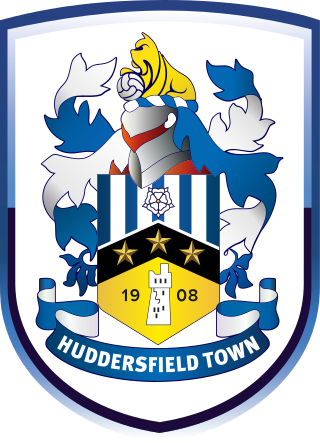
Huddersfield Town Association Football Club is a professional association football club based in Huddersfield, West Yorkshire, England. They compete in EFL League One, the third level of the English football league system.
The Football League War Cup was an association football tournament held between 1939 and 1945. It aimed to fill the gap left in English football by the suspension of the FA Cup during the Second World War. Though it was often referred to in contemporary coverage as the "League Cup" or "Football League Cup", it is not to be confused with the later English football competition with the same name, which was formed in 1960 and is currently known as the EFL Cup. As with all wartime football in England, records and statistics from the competition are not considered official.

Thomas Clarke is an English former professional footballer who played as a defender or midfielder. He played for Huddersfield Town, Preston North End and Salford City. Clarke is a former England youth international, having represented England at both under-18 and under-19 level.
Clement Stephenson was an English footballer whose 20-year career at Aston Villa and Huddersfield Town included success in both the FA Cup and League Championship. Stephenson's place in history as an inside forward was assured when Herbert Chapman targeted him as the man to lead Huddersfield Town's challenge for three consecutive Football League titles in the 1920s, he also made a single appearance for England in that period.

The 1920 FA Cup final, the first since the end of the First World War, was contested by Aston Villa and Huddersfield at Stamford Bridge. Aston Villa won 1–0, with the goal coming in extra time from Billy Kirton, to clinch the trophy for a record sixth time. This was the first ever FA Cup Final to require extra time to be played.

The 1936 FA Cup final was a football match between Arsenal and Sheffield United on 25 April 1936 at Wembley. The showpiece match of English football's primary cup competition, the Football Association Challenge Cup, it was the 61st Cup final, and the fourteenth at the national stadium.

The 1938 FA Cup final was contested by Preston North End and Huddersfield Town at Wembley Stadium. Preston, losing finalists the previous year, won by a single goal. This was their second win in the competition.
William Henry Smith was a professional footballer who played most of his career at Huddersfield Town.
The 1991–92 FA Cup was the 111th season of the world's oldest knockout football competition, The Football Association Challenge Cup, or FA Cup for short. Liverpool beat Sunderland 2–0 in the final to take their 5th FA Cup trophy.
The 1937–38 FA Cup was the 63rd staging of the world's oldest football cup competition, the Football Association Challenge Cup, commonly known as the FA Cup. Preston North End won the competition for the second time, beating Huddersfield Town 1–0 after extra time in the final at Wembley.
The 1919–20 FA Cup was the 45th season of the world's oldest association football competition, the Football Association Challenge Cup, and the first since the cancellation of all football competitions due to the First World War. Aston Villa won the competition, beating Huddersfield Town 1–0 in the final at Stamford Bridge, London.
The 1921–22 FA Cup was the 47th season of the world's oldest association football competition, the Football Association Challenge Cup. Huddersfield Town won the competition, beating Preston North End 1–0 in the final at Stamford Bridge, London.
Huddersfield Town's 1937–38 campaign was like many recent years dominated by the club's FA Cup run. They reached their 5th and final FA Cup final, before losing to Preston North End at Wembley. They finished their league season in 15th place in Division 1.
Huddersfield Town's 1921-22 campaign saw the club win their first trophy in their 14-year history. By beating Preston North End at Stamford Bridge, Town won the FA Cup for the first and, As of 2022, only time. After an up-and-down season in the league, they finished in 14th place.
James Frederick Mitchell, also known as Jim Mitchell, and sometimes Fred Mitchell, was an English footballer who played at both professional and international levels as a goalkeeper. Mitchell played professionally for five different clubs – Blackpool, Northern Nomads, Preston North End, Manchester City and Leicester City – across two different leagues – the Football League and Lancashire Combination. Mitchell played in the 1922 FA Cup final and also earned one cap for the England national side in 1924.

Harry Charles Bunn is an English professional footballer, who plays for Hyde United.
The 2015–16 FA Women's Premier League Plate is the second running of the competition, which began in 2014. It is the secondary League Cup competition run by the FA Women's Premier League, and is run in parallel with the league's primary League Cup competition, the Premier League Cup.
The 2014–15 FA Women's Premier League Plate was the inaugural season of the Premier League Plate, which was introduced as a secondary League Cup competition of the FA Women's Premier League.
The 1919–20 English football season was the 28th season in the Football League for Aston Villa, and the first following the end of World War I. Villa won their sixth FA Cup at the end of season, beating Huddersfield Town 1–0 at Stamford Bridge.








